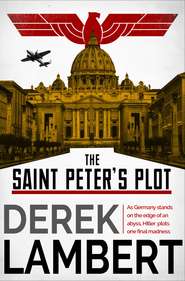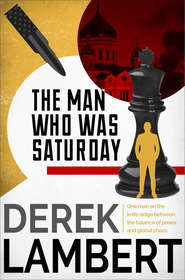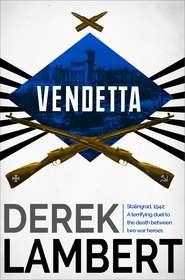По всем вопросам обращайтесь на: info@litportal.ru
(©) 2003-2024.
✖
The Yermakov Transfer
Автор
Год написания книги
2018
Настройки чтения
Размер шрифта
Высота строк
Поля
Shiller was a gaunt man with a muddy complexion, hollow cheeks and bad teeth. His repressions were even stronger than Pavlov’s because, unlike Pavlov, he was a practising Jew. His greatest temptations came at such times as the New Year and the Atonement or the days when Yizkor, the prayer for the dead, was offered. Then he wanted to visit the Synagogue; but if he did he would alert the police. Even to be near the synagogue on Arkhipova on the Sabbath was dangerous because it was under K.G.B. surveillance. So Shiller prayed in private, ate his matzos in secret, recited the Passover prayer “Next year in Jerusalem”, and waited.
In one way Shiller was weaker than Pavlov: he was too religious to be a ruthless killer: Pavlov had no such inhibitions. But if there was ever to be any rift, any struggle for power, it would be between these two men.
The apartment belonged to Mitin the poet. He made coffee while, on a rickety table covered with linoleum, under the benign gaze of Lenin framed on the wall, the other two men played chess. A get-together of old friends should the 1 a.m. knock on the door be heard.
Shiller said bitterly: “Last week I helped to arrange the publication of a statement from our religious leaders. “Like citizens of other nationalities, Jews enjoy all the rights guaranteed by the Constitution, including the right to profess their own religion.”
He knocked aside one of Pavlov’s pawns with his bishop. “I got six so-called Rabbis’ signatures on that statement.”
“Shit on the Rabbi,” said the poet. He was a slim young man with a pale face, a monkish fringe of hair and a foul mouth. Whereas Shiller would have liked to smuggle Bibles into Russia, Mikin would have liked to smuggle Soviet literature out. His frustration found a small outlet in profanity, the brutalising of his love-affair with words.
Pavlov said: “We mustn’t get impatient. We’re all making sacrifices. We are getting nearer our goal every day.” He moved one of his own black bishops and called: “Check.”
“What goal?” Shiller asked. He frowned at the wooden board and pieces made in a labour camp. “Since when have we had a goal?”
“Piss on you,” exclaimed the poet. “We’ve had an ideal for years, a goal for months.”
“Ah,” Shiller muttered, “that goal. I apologise. I thought for a moment Pavlov meant we had a way of achieving it.”
Shiller moved his knight and Pavlov said: “You’re in check. Perhaps you misheard that as well.”
Shiller took back the knight without apologising. “How are we getting nearer our goal?”
Pavlov took a sheet of paper from his pocket. It had eleven names on it. Pavlov read out the first name, adding the data from memory.
“Skolsky.” He paused, thinking. Yosef Skolsky, aged forty-two. Top physicist at the Scientific Institute of Nuclear Physics, Moscow. A pupil of Academician Andrei Sakharov, the father of the Soviet atom bomb, our leading dissident. Two applications for exit visas to Israel. Refused on the grounds that his relatives in Tel Aviv were too distant.”
He read out another name. “Kremer, Yakov. Corresponding member of the U.S.S.R. Academy of Sciences. Aged fifty. One application refused. Again – remoteness of kin.”
The penultimate name was: “Zivz, Mikhail. Aged twenty-eight. Brilliant nuclear physicist working at the Scientific Research Centre in Akademgorodok fifteen miles from Novosibirsk. Permission refused once. Reason – still subject to Army service.”
The last name was Gopnik.
Shiller asked: “Who’s he?”
Pavlov swooped with his queen. “Checkmate,” he said.
“Who is Gopnik?”
“My conscience.”
Mitin served the coffee. “Since when did you have a conscience?” he asked.
Pavlov sipped the sweet black coffee. “It doesn’t matter.” He ran his hand through his hair. “What matters is this: ten of those eleven names constitute the human components of one hydrogen bomb. Quite a gift for the Promised Land, eh?”
* * *
But how? Part of the answer came to Viktor Pavlov at the Leningrad skyjack trial. This skyjack had failed miserably, but even if it succeeded, it would only have benefited a handful of nonentities. And, in any case, skyjacks were old-hat, bearing the hallmark of Arabs, Cubans and maniacs. An old-fashioned kidnap had more panache.
Once again the adrenalin started to flow. What if they kidnapped a Kremlin leader and held him against the release of the ten nuclear-physicists? The idea had a beautiful suicidal glory to it, the Masada Complex. Except that it was totally impracticable.
Or so it seemed until Viktor Pavlov heard that Vasily Yermakov was travelling on the Trans-Siberian Railway in the October of 1973, the year of the 25th anniversary of the founding of the State of Israel.
CHAPTER 2 (#ulink_3a1b7a76-386d-50cc-8034-793ebcca4283)
The first stop was Yaroslovl. Trans-Siberian No. 2 pulled in sharp at 14.02 Moscow time. But it wasn’t until Sharia, which they reached on time at 20.22, that the first Zionist agent boarded the train.
He was a stocky man with a white face and a scar beside his mouth. He wore a black overcoat, fur boots and a sealskin hat.
He stood near a stall where blunt-faced women wearing blue scarves round their hair sold food from a canvas-covered pushcart. Meat pastries, fried chicken and fish, icecream and beer.
As the train slid into the station the agent whose name was Semenov clapped his gloved hands together. Cold or nerves or both.
The Trans-Siberian hadn’t yet reached the snow. But the air was sharp with frost glittering on the platform. It was almost dark.
In the lighted window of the special coach he saw Yermakov’s face. The glass had misted-up so that the outlines were blurred; it reminded Semenov of a face masked with a stocking.
Framed in a window of coach 1251, Semenov saw the face of Viktor Pavlov. He shivered inside his warm overcoat and took a white handkerchief from his pocket. Pavlov’s face faded.
Before the train stopped K.G.B. officers dropped off like commuters late for work. They lined up the waiting passengers and began to check their papers. Local militia who had already done the job protested but they were pushed aside; it reminded Semenov of the airport scene at the time of the abortive skyjack when Moscow and Leningrad security officers fought each other.
Semenov was fourth in line. He handed his papers to a brusque K.G.B. man. The K.G.B. officer glanced at them, smiled slightly and said softly: “Welcome aboard, Comrade.”
Semenov the Policeman, a member of the K.G.B. with the best cover of all the Zealots, nodded and climbed into a carriage. The cover also enabled him to carry a gun.
* * *
Standing beside Pavlov in the corridor, was Stanley Wagstaff, the trainspotter from Manchester. His mind was a filing cabinet of railway statistics and trains were his substitute for the hungers that affected other men; if his wife ever wanted to divorce him she would have to cite a locomotive.
For twenty years Stanley Wagstaff had saved for this trip. He knew the Trans-Siberian’s history, every station, every class of locomotive.
He pointed into the gathering darkness and said to Pavlov: “See those over there?”
Pavlov looked, dimly seeing the silhouettes of old black steam engines with coal cars; they looked like a herd of elephants shouldered close to each other.
“There’s fifty of them,” Stanley Wagstaff informed him. “Sad, isn’t it? A graveyard.”
“Very,” said Pavlov. He saw Semenov signal with the handkerchief and leaned back against the wall.
“Did you know,” Stanley asked, “that Russia has the widest gauge in the world?”
Pavlov shook his head; Stanley thought he detected a man eager to have his ignorance repaired.
“Yes,” Stanley continued, his voice assuming authority and importance, “it’s five feet unlike the standard gauge of 4 ft. 8½ inches used in Europe and America. Whistler – you know, the painter’s father – recommended it. A lot of people reckoned they had a bigger gauge to stop trains being used by invading armies.” He paused, waiting for reaction; but there was none. “In fact it worked the other way. It’s much easier for an enemy to re-lay one line on a broad gauge than it is for the Russians to widen an enemy gauge. They found that out when they attacked the Poles in the Civil War.”
The train began to move out of the station. Stanley spotted a stationary engine, whipped out his notebook and recorded its number, JI 4526. “An old L class freight locomotive,” he said. “I wonder what it’s doing here.”
The stranger didn’t seem to care. He was staring out of the window at the dark countryside moving by. A strong, dark man filled with some inner intensity. But not for trains. Stanley Wagstaff persevered a little longer.
Другие электронные книги автора Derek Lambert
The Red Dove




 3.67
3.67
Vendetta




 0
0











